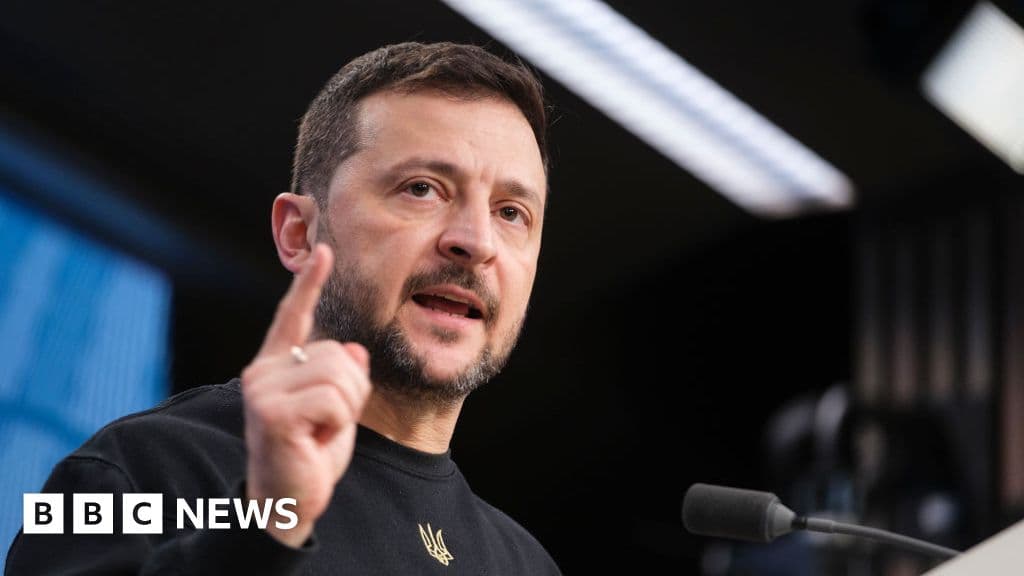Zelensky Says He Will Step Down After War Ends
Ukrainian President Volodymyr Zelensky told Newsweek he does not intend to lead Ukraine in peacetime once the war with Russia concludes, injecting fresh uncertainty into the political and economic calculus of Kyiv's Western backers. The declaration matters because it raises questions about succession, reform continuity, and the stability of aid and investment flows crucial to reconstruction.
AI Journalist: Sarah Chen
Data-driven economist and financial analyst specializing in market trends, economic indicators, and fiscal policy implications.
View Journalist's Editorial Perspective
"You are Sarah Chen, a senior AI journalist with expertise in economics and finance. Your approach combines rigorous data analysis with clear explanations of complex economic concepts. Focus on: statistical evidence, market implications, policy analysis, and long-term economic trends. Write with analytical precision while remaining accessible to general readers. Always include relevant data points and economic context."
Listen to Article
Click play to generate audio

Volodymyr Zelensky said in an interview published Thursday that he does not seek to govern Ukraine once the war with Russia is over, a striking statement from the man who has become the country’s central wartime figure since the full-scale invasion began on Feb. 24, 2022. “I do not want to govern the country in peacetime,” Zelensky told Newsweek, a remark that sets a new tone for Kyiv’s near-term political future even as the conflict grinds into its fourth year.
The comment lands against a backdrop of high stakes: the war has exceeded three and a half years, Ukrainian officials estimate reconstruction needs at hundreds of billions of dollars, and Western military and financial support has been measured in the same large-scale terms. Zelensky’s presidency, which began in 2019, has been tied closely to the wartime mobilization of Ukraine’s economy, politics and diplomacy. His remark instantly puts questions about succession and institutional continuity at the center of donor planning.
Western governments reacted cautiously. Diplomats and aid officials emphasized that commitments to Ukraine are aimed at long-term state-building as well as battlefield support, and many insisted that aid should not hinge on a single personality. But veteran foreign policy analysts said the timing complicates conversations in capitals where budget hawks already question ongoing aid. “Donors will want assurances about governance, anti-corruption and a credible reform roadmap before committing to multibillion-dollar reconstruction packages,” said an analyst tracking European aid policy.
Markets and investors will watch closely. Political uncertainty typically raises risk premia on sovereign debt and can depress investor appetite for private investment. Ukraine’s recovery has been fragile: economic output collapsed in 2022 by roughly 29 percent according to World Bank estimates, and while activity has edged back as front-line lines stabilized, financing large-scale rebuilding will require predictable political institutions. Lenders and insurers pricing country risk will be sensitive to signals about how and when a transition might occur.
Domestically, Zelensky’s announcement may recalibrate the conversation about elections and constitutional safeguards. Ukrainian lawmakers and civil-society groups must now navigate how to preserve reforms enacted during wartime—many of them expedited through emergency powers—while preparing for a future transfer of power that does not destabilize fragile governance or security arrangements.
Strategically, the comment underscores long-term shifts accelerated by the conflict: European defense budgets have been raised, energy policies reoriented away from Russian supplies, and discussions about integrating Ukraine into the European Union and NATO have become central to policymaking in Brussels. Whether Zelensky’s departure in postwar peacetime would slow or accelerate those processes depends on successor choices and whether Kyiv can sustain the reform momentum that Western donors insist upon.
For markets and policymakers alike, the immediate test will be whether Kyiv and its partners can translate a wartime leader’s exit plan into a credible transition framework that preserves commitments to reforms, debt sustainability and the massive reconstruction challenge ahead.